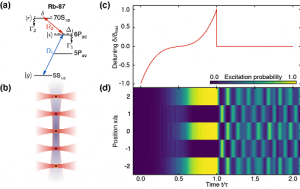Summary
Quantum simulators enable probing the static and dynamic properties of correlated quantum many-body systems that would otherwise be numerically inaccessible using classical simulators. We are developing quantum simulators based on arrays of neutral atoms excited to Rydberg states. Such Rydberg atom arrays are advantageous for simulating the dynamics of interacting spin systems (Ising spin models) in higher dimensions and arbitrary geometries. Our first simulator uses alkali atoms trapped in two-dimensional arrays of optical tweezers. It is currently being designed, built and operated by our team. It will be used for studying many-body quantum dynamics, non-equilibrium physics, and quantum chaos. We will explore these areas after optimizing our control gates and engineering interactions using coherent excitation to Rydberg states. We will also explore novel ideas presented by the early adopter community, such as approaches to gain better insight into advanced materials. Finally, as this project involves the development of novel quantum hardware, including an optimal control toolbox and advanced laser systems, it may lead to further application to quantum enhanced sensing and precision metrology.

Figure 1. Classical simulation of the dynamics of a chain of five interacting atoms exhibiting coherent many-body oscillations after being adiabatically driven across a phase transition from a disordered state into an ordered state and suddenly quenched into a far-from-equilibrium state. Quantum simulators enable extending those simulation results into numerically inaccessible regimes for larger system sizes and higher dimensions.
Related Content

Chiral Quantum Antenna Based on Multilayer Metasurface
Summary Individual atoms can act as stationary qubits and thus serve as nodes in quantum computing networks or as memories for quantum repeaters. However, to successfully use qubits based on single atoms suspended in free space, photons emitted by a single atom need to be efficiently collected. Conventionally, this can be done with high […]
September 20, 2018

Novel Infrared Camera Based on Quantum Sensors for Biomedical Applications
Summary In this project we develop a novel infrared camera with low noise and high detection efficiency for biomedical applications of optical coherence tomography (OCT) using quantum materials. OCT is a technique used to image the back of the eye and allow for the diagnosis of detrimental eye conditions, for e.g., macular degeneration, diabetic retinopathy […]
March 13, 2019

Topological Quantum Computing on Majorana Platform
Full-scale quantum computing will require the capability for error-tolerant quantum information processing.
January 11, 2017

Cryo-CMOS to Control and Operate 2D Fault-Tolerant Qubit Network
Summary Large-scale, fault-tolerant quantum computation requires precise and stable control of individual qubits. This project will use complementary metal-oxide-semiconductor (CMOS) technology to provide a cost-effective scalable platform for reliable and high-density control infrastructure for silicon spin qubits. We will use sub-micron CMOS technology to address device and circuit-level challenges and explore the integration of […]
June 14, 2018

